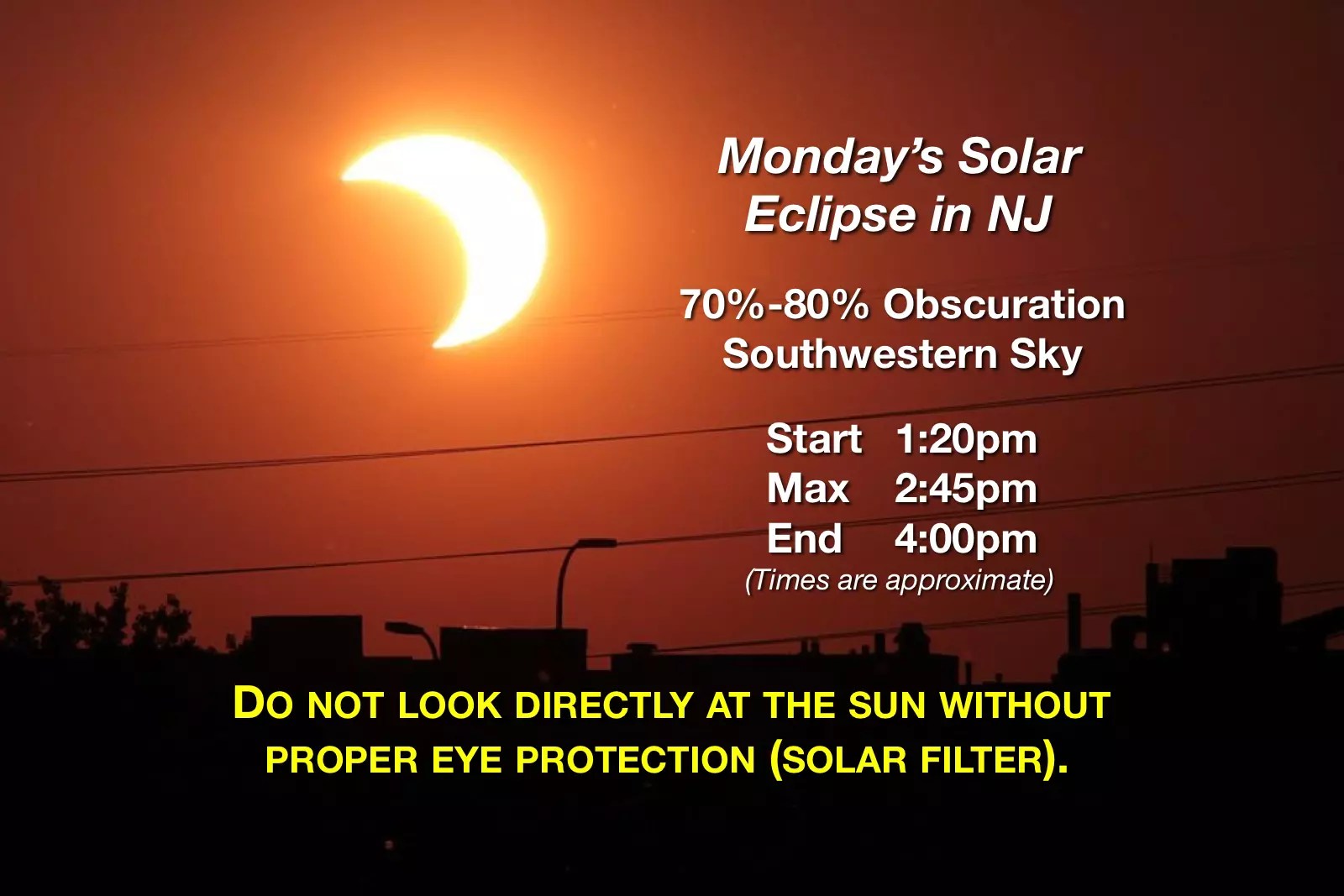Are you ready for an astronomical event that promises to captivate and inspire? The upcoming eclipse on Monday in New Jersey is not just a celestial phenomenon; it's an experience that many look forward to with excitement. Knowing the exact timing of the eclipse is crucial for everyone hoping to witness this extraordinary event. In this article, we will delve into the details of the eclipse, including its timing, how to safely view it, and the significance of such celestial events. Whether you are an astronomy enthusiast or just curious, this guide will provide you with all the information you need to enjoy the eclipse to the fullest.
As we approach the date of the eclipse, many questions arise. When will it occur? What can we expect to see? Will the weather cooperate? These are just a few of the queries that will be addressed in this article. We will also explore the best practices for viewing the eclipse safely, ensuring that you do not miss out on this spectacular sight.
This guide aims to equip you with knowledge about the eclipse on Monday in NJ, including its timing, significance, and tips for a memorable viewing experience. So, let’s get started and prepare for an awe-inspiring celestial display!
Table of Contents
- Eclipse Timing
- Significance of the Eclipse
- How to View the Eclipse Safely
- Fascinating Facts About Eclipses
- Other Phenomena Related to Eclipses
- Historical Eclipses in NJ
- Future Eclipses to Look Forward To
- Conclusion
Eclipse Timing
The eclipse on Monday in New Jersey is expected to occur at specific times that will vary slightly depending on your location within the state. Here are the key times to note:
- Start of Partial Eclipse: 1:58 PM EDT
- Maximum Eclipse: 3:16 PM EDT
- End of Partial Eclipse: 4:24 PM EDT
Make sure to arrive at your viewing spot early to settle in and prepare for this astronomical event!
Significance of the Eclipse
Eclipses have fascinated humanity for centuries, often being seen as omens or significant events. The significance of an eclipse can be viewed from various perspectives:
- Astronomical Importance: Eclipses provide scientists with opportunities to study the sun's atmosphere and other celestial phenomena.
- Cultural Impact: Many cultures have rich traditions and beliefs surrounding eclipses, celebrating them as important spiritual events.
- Educational Opportunities: Eclipses serve as a great way to engage students and the public in science, sparking interest in astronomy and space exploration.
How to View the Eclipse Safely
While witnessing an eclipse can be thrilling, it is essential to prioritize safety. Here are some tips to view the eclipse safely:
- Use Solar Eclipse Glasses: Ensure that you have proper eclipse glasses that meet the ISO 12312-2 international safety standard.
- Do Not Look Directly at the Sun: Even during an eclipse, looking directly at the sun can cause serious eye damage.
- Use a Pinhole Projector: A pinhole projector can help you safely view the eclipse without directly looking at the sun.
Always prioritize your safety and the safety of others while enjoying this celestial event.
Fascinating Facts About Eclipses
1. Types of Eclipses
There are three main types of eclipses: total, partial, and annular. Each type offers a unique viewing experience.
2. Frequency of Eclipses
Eclipses occur at least twice a year, but total solar eclipses are rare for any given location.
3. The Path of Totality
The path of totality is the area where a total eclipse can be viewed. Outside this path, observers may only see a partial eclipse.
Other Phenomena Related to Eclipses
During an eclipse, other fascinating phenomena can also be observed:
- Shadow Bands: These are wavy lines that may appear on the ground just before and after totality.
- Temperature Drop: A noticeable drop in temperature often occurs during a total solar eclipse.
- Animal Behavior: Animals may exhibit unusual behavior, mistaking the eclipse for nightfall.
Historical Eclipses in NJ
New Jersey has witnessed several notable eclipses throughout history:
- August 21, 2017: A total solar eclipse visible across the continental US, with many in NJ traveling to the path of totality.
- June 24, 1778: A significant solar eclipse observed by early American settlers.
Future Eclipses to Look Forward To
Mark your calendars! Here are some upcoming eclipses that will be visible in New Jersey:
- April 8, 2024: A total solar eclipse that will cross parts of the northeastern US.
- August 12, 2026: A partial solar eclipse that will be visible in NJ.
Conclusion
As we approach the eclipse on Monday in New Jersey, it is essential to be prepared and informed. Knowing the timing and safety measures can enhance your viewing experience. Eclipses are not just beautiful sights; they are significant events that connect us to the universe and inspire curiosity about the cosmos. Don’t forget to share your experiences and photos of the eclipse!
We encourage you to leave a comment below sharing your thoughts or questions about the eclipse. Additionally, feel free to share this article with friends and family who may be interested in witnessing this remarkable event. Happy eclipse watching!
Thank you for reading, and we hope to see you back here for more exciting astronomical updates and guides!



